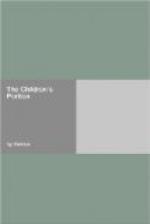Yestergold was the first to meet them. He was filled with anguish. His sensitive nature could not bear to see suffering in others. He shrank from the very sight of misery. Turning to his companions, he said, “If the Lord of Life had been traveling on this road as He was on that other, long ago, when the widow of Nain met Him with her dead son, He would have destroyed the plague by a word.” “Oh, holy and beautiful Age!” exclaimed the poet, “why dost thou lie in thy soft swathings of light, and power to do mighty deeds, so far behind us in the past?” “But let us use it as a golden background,” said the painter. “That is the beautiful Age on which Art is called to portray the Divine form of the Great Physician!” Saying these fine words, the party rode swiftly past.
The terrified villagers were still streaming across the road when Goldmorrow came up. Nothing could exceed the pity which the spectacle stirred in his breast. Tears streamed from his eyes. The bareness, the poverty, the misery of the present time seemed to come into view and gather into a point in what he saw. “Oh!” he cried to his companions, “if Christ were only come! Only He could deal with evils so great as these!” Then, withdrawing his thoughts into himself, and still moved with his humane pity, he breathed this prayer to Christ: “Come, Lord Jesus, come quickly, and lay thy healing hand on the wounds and sorrows of the world.” His companions were also touched with what they saw. And in earnest and reverent words one of them exclaimed: “Blessed hope! Light of the pilgrim! Star of the weary! The earth has waited long thy absent light to see.” But, by the time the words were spoken, the villagers were behind them, and, spurring their horses, the travelers hastened forward on their way.
IV.
A plague-stricken village.
The dust raised by their horses’ hoofs was still floating over the highway when Goldenday, with his sister and their attendants, rode up to the spot. Two or three groups of the fugitives had made a temporary home for the night under the shelter of the trees on the left. Others were still arriving. The pale faces, the terrified looks of the villagers, filled the Prince with concern. “It is the pestilence,” they said, in answer to his inquiries. “The pestilence, good sir, and it is striking us dead in the very streets of our village.” The Prince turned to his sister. She was already dismounted. A light was in her eye which at once went to his heart. The two understood each other. They knew that it was Christ and not merely a crowd of terrified peasants who had met them. They were His eyes that looked out at them through the tear-filled eyes of the peasantry. It was His voice that appealed to them in their cries and anguish. He seemed to be saying to them: “Inasmuch as ye do it to one of the least of these, ye do it unto Me.” In a few moments the Prince had halted his party and unpacked his stores, and was supplying the wants of the groups on the left. Before an hour was past he had brought light into their faces by his words of cheer, and, with his sister and his servants, was on his way to the plague-stricken village.




